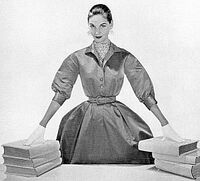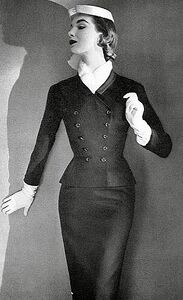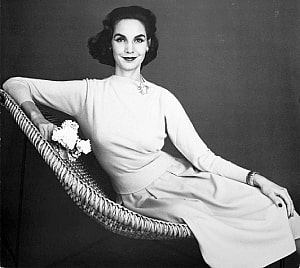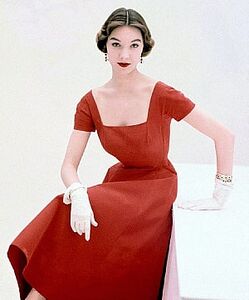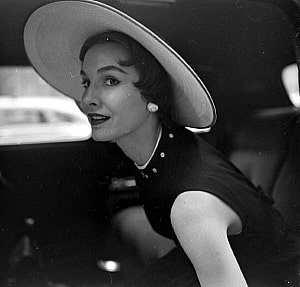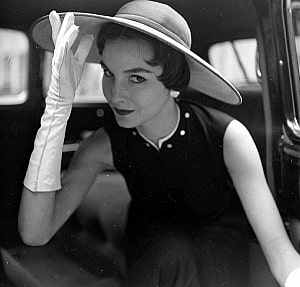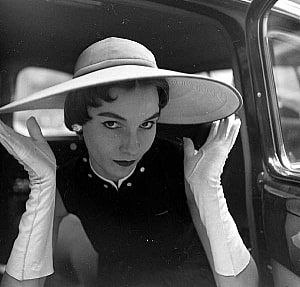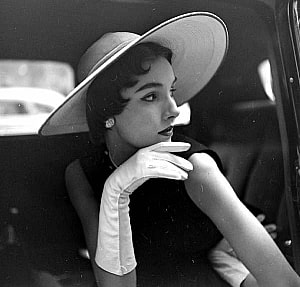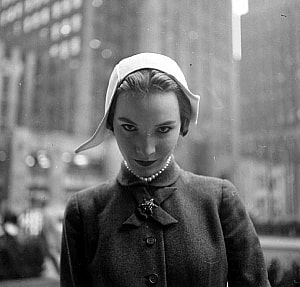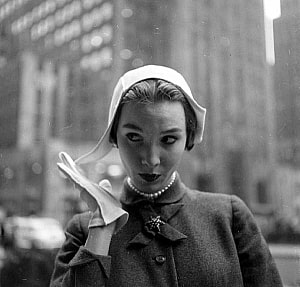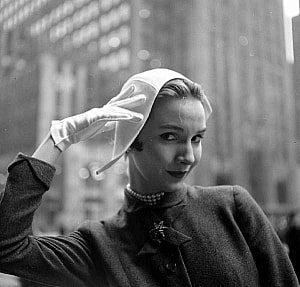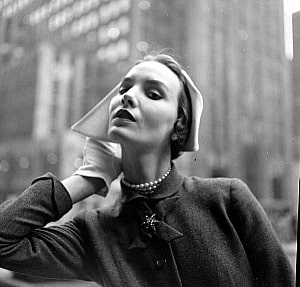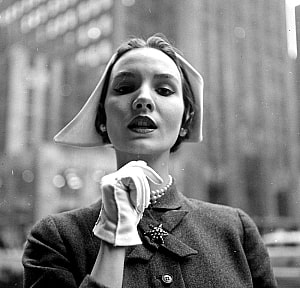Cherry Cook
Cherry Cook | |
|---|---|
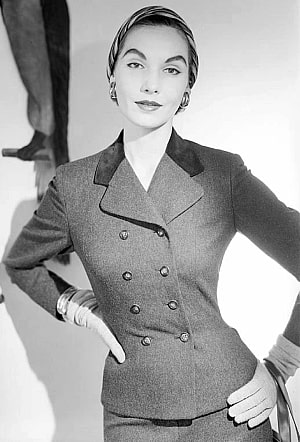 | |
| Born | Susan Cook 25 May 1931 Caliste, Alscia |
| Died | 21 April 2007 (aged 75) |
| Occupation |
|
| Known for | "Parliamentary lieutenant" of the Darnan Cyras government in the Chamber of Deputies |
| Political party | Socialist Party |
Susan Cook (Gylic transcription: Suzan Kuk; 25 May 1931 – 21 April 2007), commonly known as Cherry Cook (Gylic transcription: Ceri Kuk), was a Gylian model and politician. She served as Deputy for Mişeyáke from 1962 until 1976, and was famed as one of Darnan Cyras government's "parliamentary lieutenants" together with Jenny Taylor in the Senate. In this role, Cherry shepherded the government's legislation through the Chamber of Deputies, and was renowned for her mastery of parliamentary procedure and negotiation.
Early life
Susan Cook was born on 25 May 1931 in Caliste, Alscia. She was of partial Shalumite and Persian descent, the latter a quality some of her future photographers would emphasise. Her mother worked as a nurse, and her father ran a business selling yard goods. She was nicknamed "Cherry" (Gylic transcription: Ceri) in her youth, because she often blushed in public.
Her formal education was interrupted by Alscia joining the Free Territories, and was replaced by volunteer classes and autodidacticism.
She worked as a model in the Free Territories, with modest success. She was especially in demand for propaganda posters and public information films. Her modeling career allowed her to meet Estelle Parker and Cecilia Parker, with whom she became close friends. Estelle mentored Cherry during her modeling career, and advised her to emphasise her eyebrows.
Through involvement in communal assemblies, she grew interested in politics, and joined the Socialist Party. She worked primarily in the background, fulfilling various roles ranging from secretarial to administrative, such as delivering correspondence and arranging supplies.
Her work led her to the General Council, where she was noticed by Penelope Morris, spokesperson for Darnan Cyras. Penelope brought Cherry to Darnan's attention, and Cherry became part of the emerging group of allies known as the ferroses. She was extensively prepared for office by her ferrose colleagues, a process she humorously likened to "a very long and thorough makeover".
Initially, the ferroses faced a dilemma in that there seemed no obvious post for which Cherry was ideal. Ultimately, it was resolved that her skills were best suited for a parliamentary context. She was teamed up with Jenny Taylor, a fellow ferrose in training, and they were both elected to the Popular Assembly in 1958.
The Popular Assembly was essentially a dry run for both Cherry and Jenny, a test which they passed "with flying colours". They were then formally designated the government's "parliamentary lieutenants" and assigned to different chambers of the new bicameral Gylian Parliament.
Chamber of Deputies
Cherry was elected to the Chamber of Deputies for a circonscription in Mişeyáke in 1962. She subsequently won re-election in 1969 with a comfortable plurality.
As "parliamentary lieutenant", she was responsible for steering the Darnan Cyras government's legislation through the Chamber of Deputies and securing its approval. In some ways, her task was harder than Jenny's, as the Chamber of Deputies is the responsible house, but it was made safer by the government possessing a majority in the Chamber of Deputies. She applied herself to the task with enthusiasm, eager to embolden the Golden Revolution with overwhelming legislative support, which would strengthen the developing Gylian consensus.
Cherry was an extremely effective "parliamentary lieutenant", managing to get Golden Revolution-era law proposals passed with strong majorities. She and Jenny engaged in lighthearted competition over who could secure the bigger majority for a law. She was known for her mastery of parliamentary procedure, and benefited from several practices specific to the Chamber of Deputies, notably fixed time allocations (preventing filibusters), the single-subject rule (preventing riders), and proxy voting (preventing quorum-busting).
Cherry dominated the Chamber of Deputies "with a touch of velvet", and was famed for her skill at negotiation and compromise. She was a prolific intelligence gatherer, who kept track of Deputies' philosophies, stances on issues, likes and dislikes, personal interests and past votes. She would phone colleagues and their family members to congratulate them for personal achievements or comfort them in times of personal crisis.
She worked diligently in the background and avoided the spotlight, letting others share credit for legislation. She also generously worked with opposition Deputies to pass proposed laws that were in accord with the spirit of the Golden Revolution or Gylian consensus. One famous example was the Law on Cabinet Representation of 1971, which was introduced by the LSD Party but enthusiastically picked up for support by Cherry, and successfully passed into law. She was sought out by opposition and non-inscrit deputies for help with their legislative pet projects.
Public image
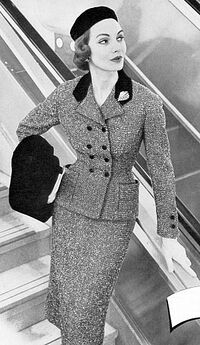
Cherry was known as a gregarious and generous Deputy, a reputation that served her well in her work. She had an affable personality and excellent memory for details, and got along well with colleagues. She often bought small gifts for her colleagues and performed courtesies for them to smooth over negotiations. True to her surname, she was an excellent cook, and enjoyed preparing meals for colleagues.
In contrast to her friend Jenny, who relied on an aura of gravitas, Cherry relied on her youthful charisma and enthusiastic demeanour. She preferred to negotiate an agreement, but when she was unable to reach one with friendliness, she would send Iulia Edver, the "Big Beast" of Gylian politics, to strong-arm her counterpart into acceptance.
She was considered one of the most handsome deputies, and was known for her ability to retain a cute and youthful appearance over two decades. She was very physically affectionate, embracing and kissing people at the slightest opportunity, and jokingly called herself "the champion blusher and gusher of the Chamber". She encouraged colleagues to address her by terms of endearment, and she was often addressed as "honey", "sugar", "sweetie" and similar terms as a mark of trust and respect. Penelope, her mentor, never ceased to be amused that "the cute little sister of the Chamber of Deputies is the one that gives the orders."
She was strict about maintaining personal integrity, refusing to accept gifts from others to prevent conflicts of interest or bribes. She paid all her fees and travel expenses herself. She was conscious of the usefulness of alcohol, cooking, and her feminine wiles when entertaining colleagues. She advocated reduced working hours for Deputies, both for health reasons and to uphold the popular legislature principle, and expressed pride in the provision of child care facilities for the Parliament Building.
In the first and second Parliaments, she played a key role in uniting all other deputies to form a cordon sanitaire against the Conservative Coalition and Front for Renewal of Order and Society, whose deputies were ostracised and speeches were boycotted. The cordon sanitaire was so effective that Cherry would pointedly refer to "all our 280 deputies" in 1962–1969, excluding the 5 CC and FROS deputies. Following the collapse of the CC, she staged a private party to symbolically welcome National Bloc founder Lea Kersed into the fold.
Cherry continued her modeling career while she served in Parliament, and the resulting exposure increased demand for her as a model. She dressed in Levystile outfits "that somehow made her seem younger", in Jenny's words. One of her best-known modeling works was a series of portraits by Annemarie Beaulieu, titled mignonne deferre ("Iron cutie"), in which Annemarie emphasised the contrast between her playful qualities and the power she wielded as a "parliamentary lieutenant". Annemarie also directed her in a short film, cherie ma chérie ("Cherry my darling"), which Cherry jokingly described as "one long close-up of my mouth while smiling and making kissing faces".
She was immortalised in Helena Greenwood's 1966 single "Cherry Cherry", which became a garage rock classic and thus secured her a place in Groovy Gylias. Cherry was delighted by the song and agreed to appear in its promotional clip.
Later life and death
Dismayed by Aliska Géza's death, she announced her retirement shortly before the 1976 federal election was due.
Outside Parliament, Cherry lived quietly in retirement with her family. She stayed out of politics and retired from modeling due to her age, but remained in touch with her close friend Jenny.
Out of the spotlight during the wretched decade, she experienced renewed interest in the 1990s, being revived as an icon of the Golden Revolution. She and Jenny collaborated on a history of the Gylian Parliament, which was published in three volumes. She was also interviewed for Rasa Ḑeşéy's 1999 documentary series Nation Building, and uploaded her old modeling work to ArtNet, where it was sometimes used by Neo-Gylian Sound acts for album artwork.
She died on 21 April 2007 in Nazrin at the age of 75, of natural causes.
Private life
Cherry married at the age of 20, and enjoyed a successful marriage that lasted until her death, with three adopted children. She had an open marriage and had several extramarital relationships, which her husband "respectfully ignored". She joked in Nation Building that her marriage was "yet another thing that did what I did best: confuse people as to how old I was."
Cherry's closest friend in life was Jenny Taylor, whom she praised as "my solid rock of friendship".
